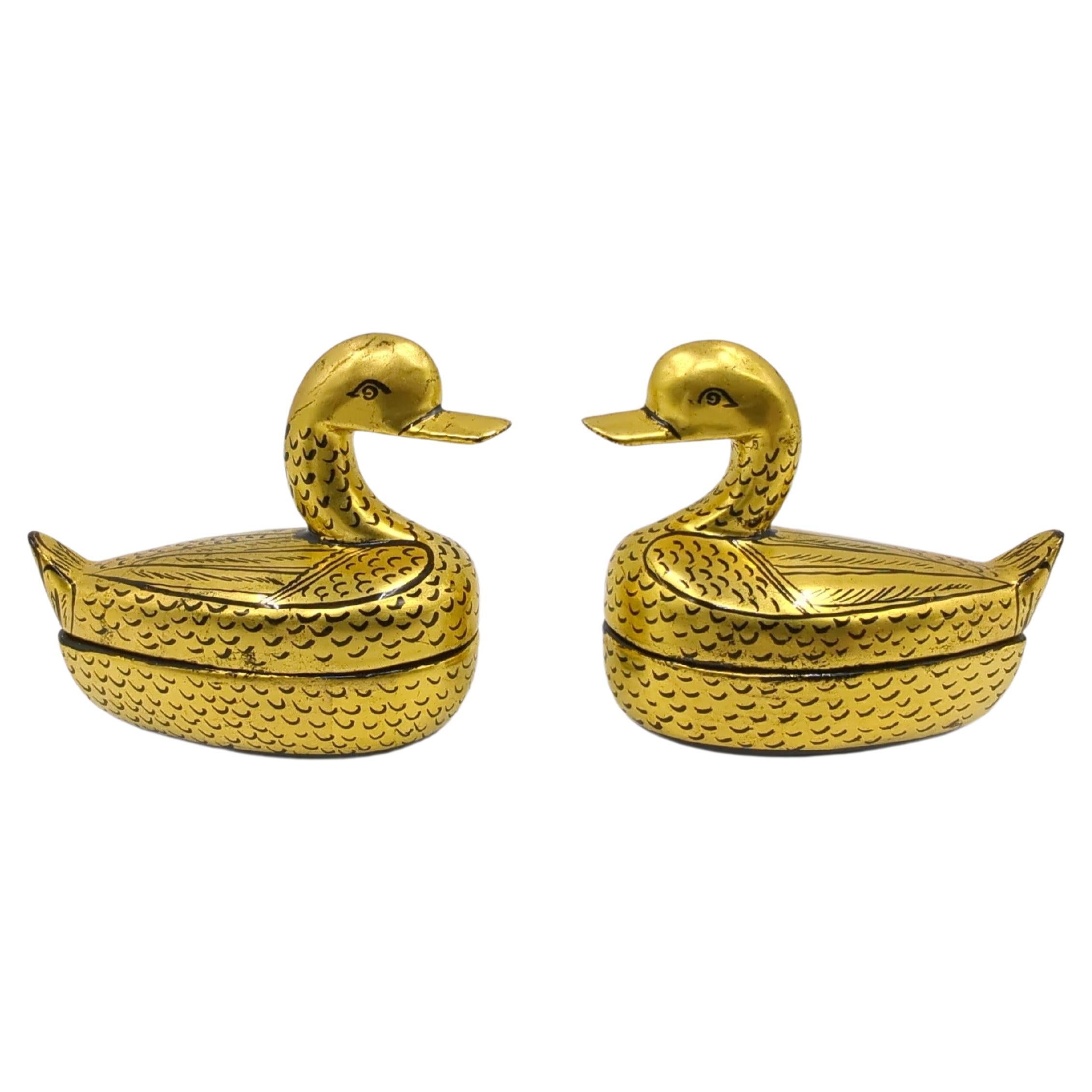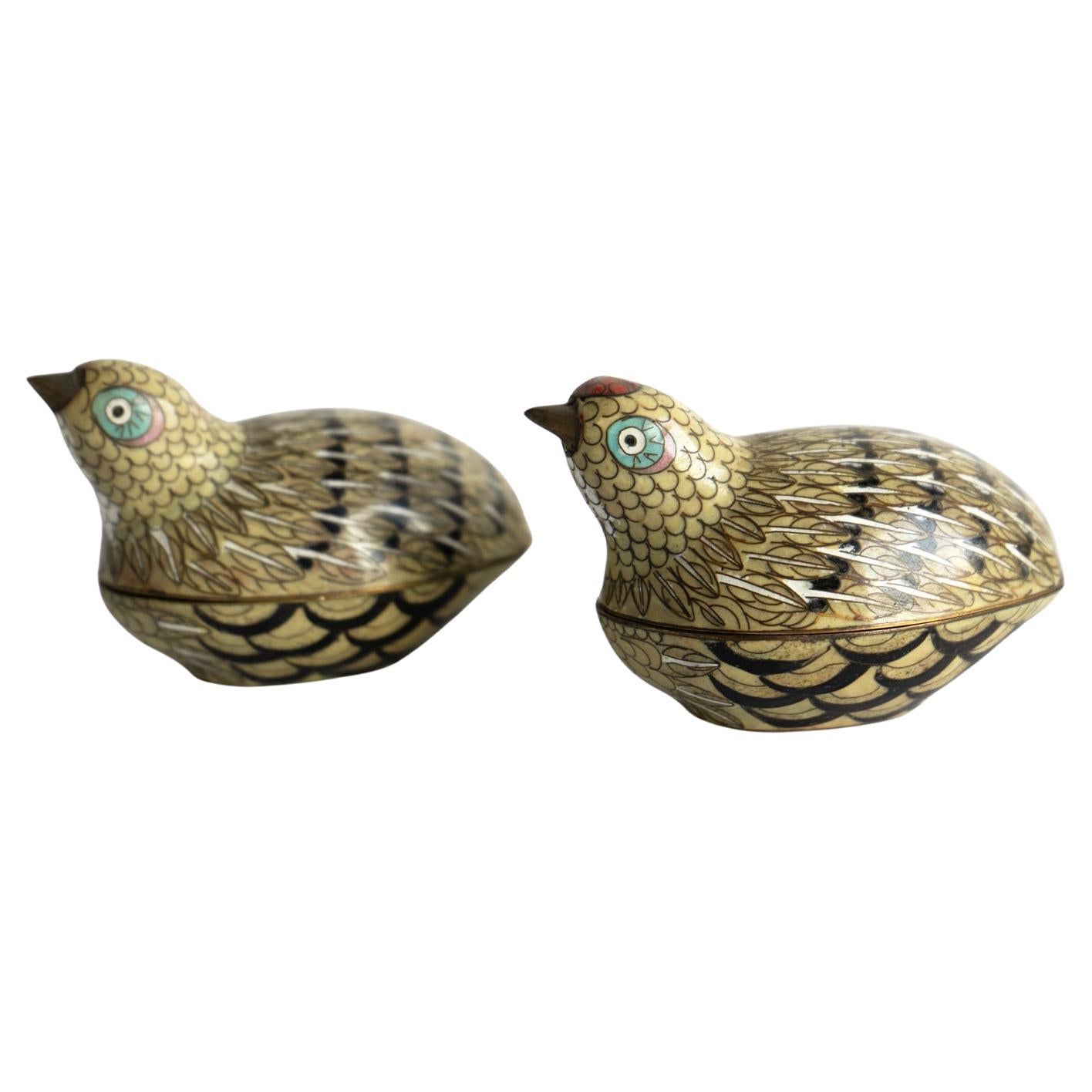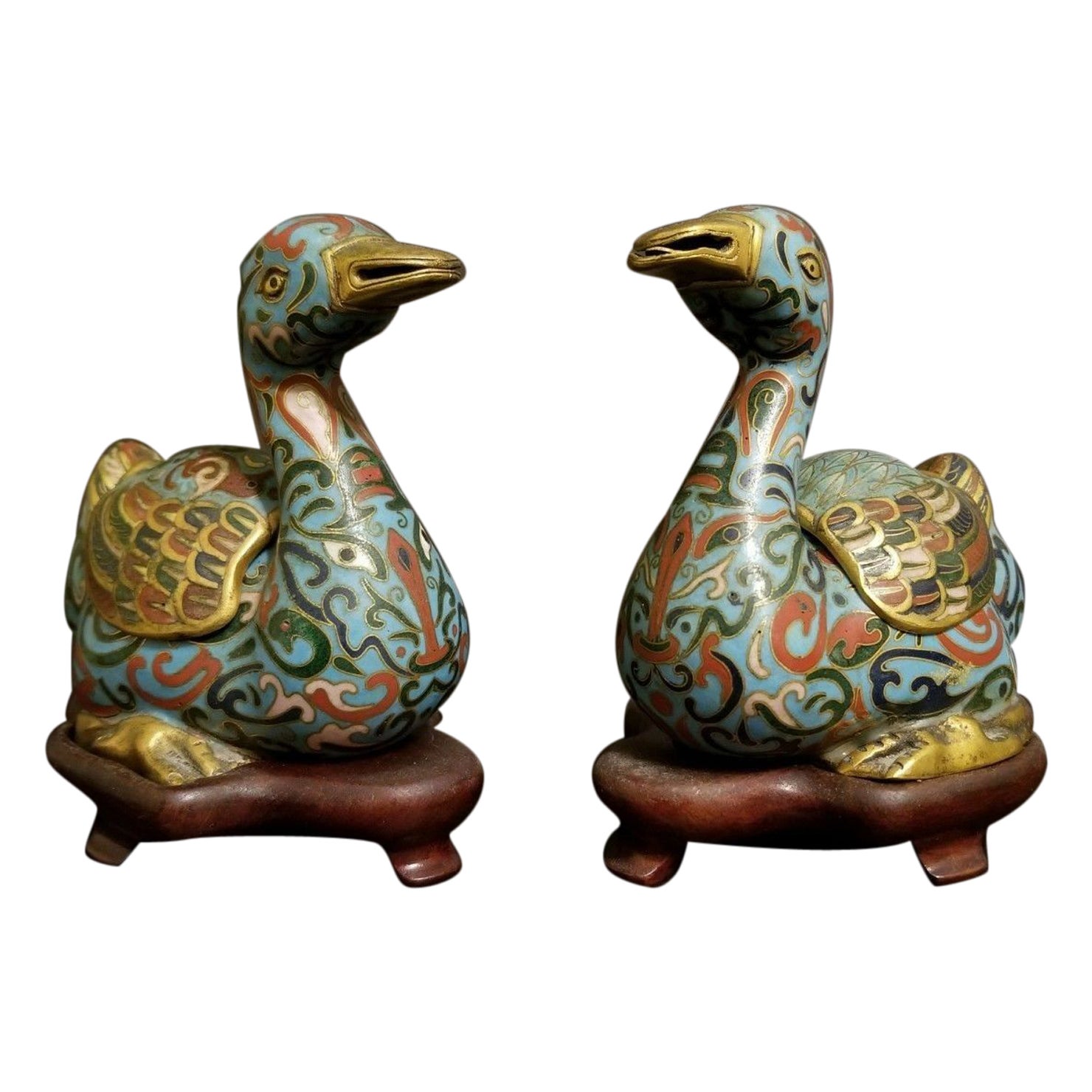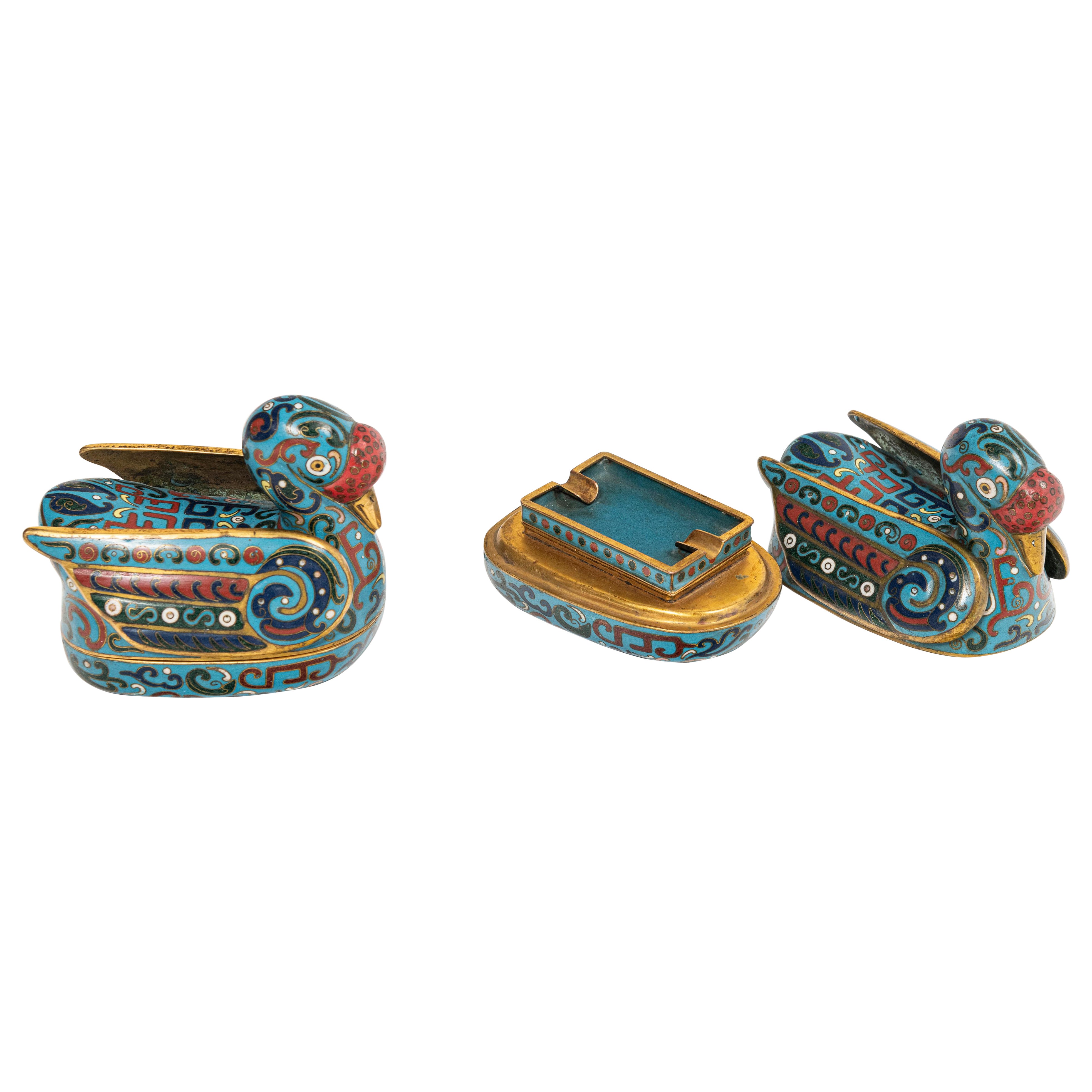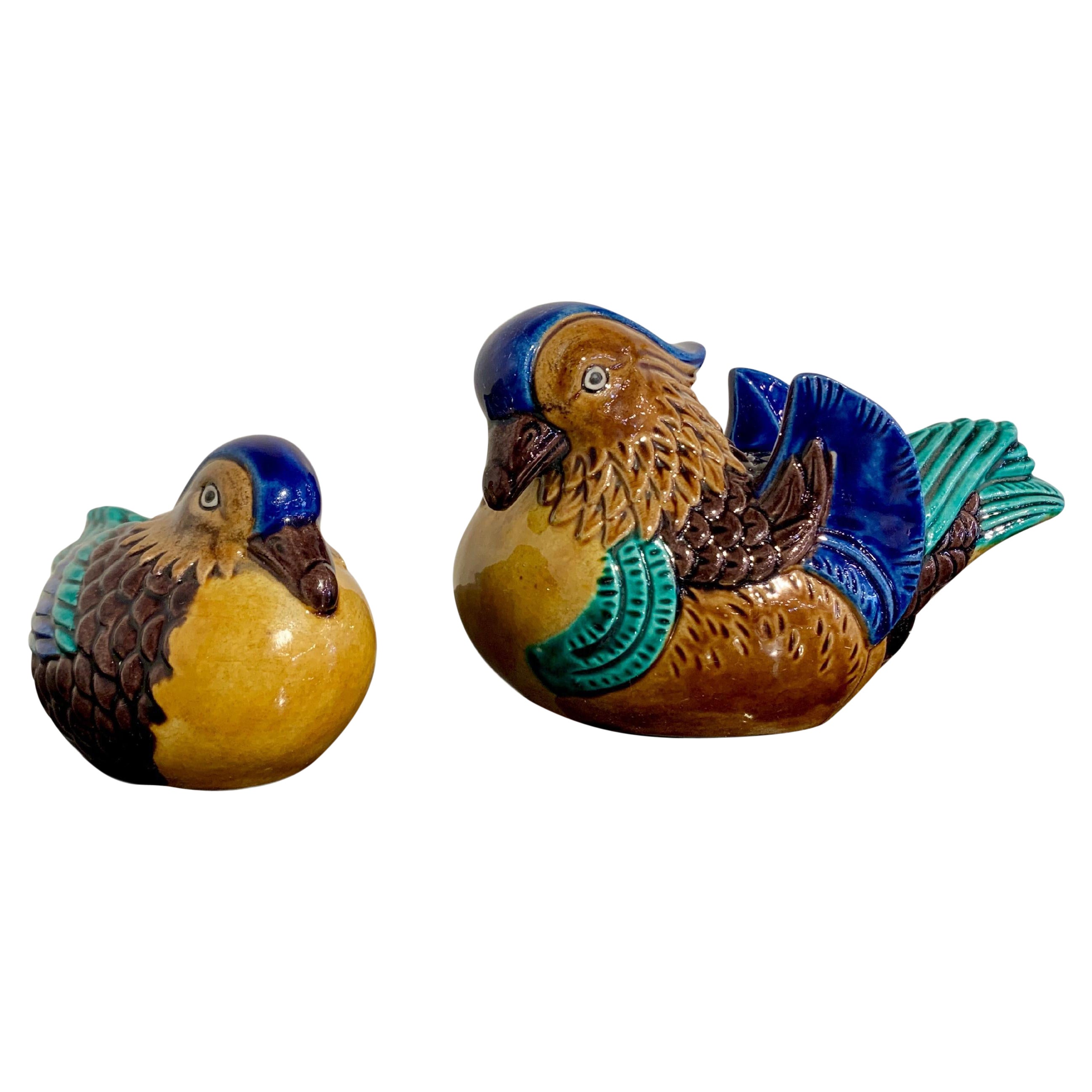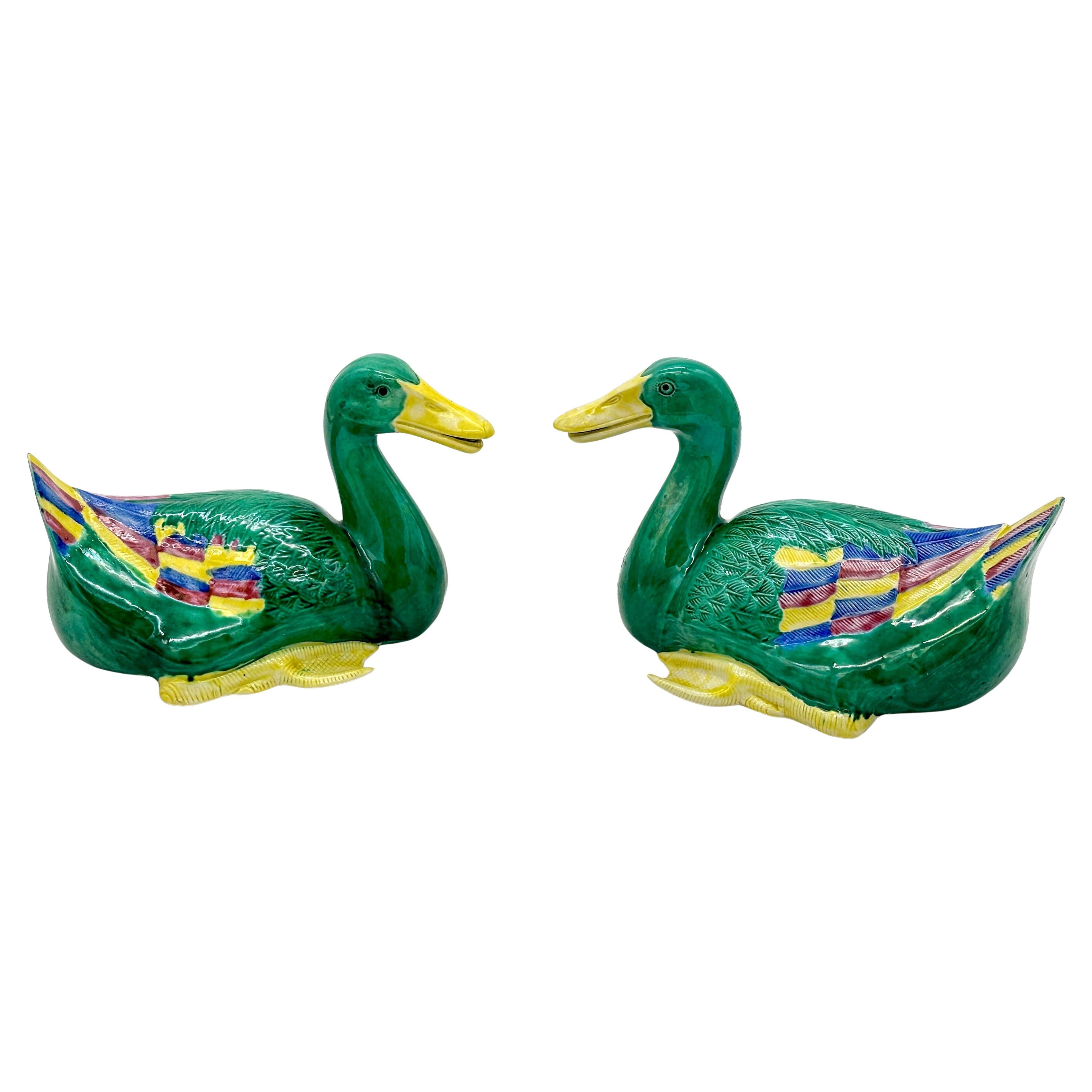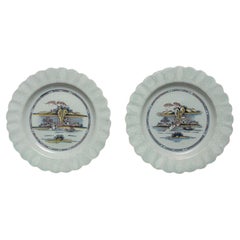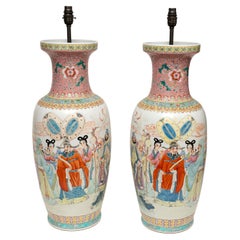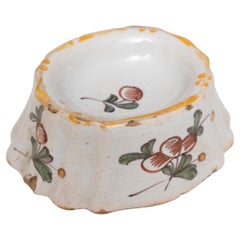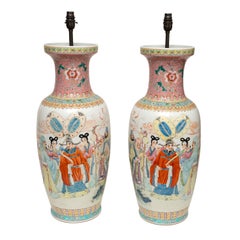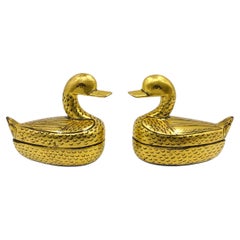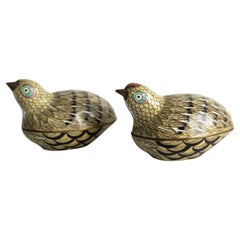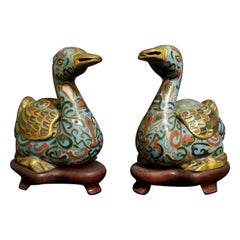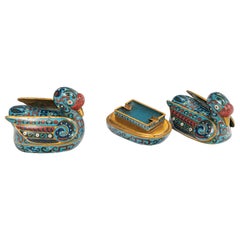Items Similar to Jewelry Ring Trinket Boxes Pair Cloisonné Swan Japanese Gift Love Valentine
Want more images or videos?
Request additional images or videos from the seller
1 of 7
Jewelry Ring Trinket Boxes Pair Cloisonné Swan Japanese Gift Love Valentine
$2,740.33per set
£2,000per set
€2,332.89per set
CA$3,753.57per set
A$4,174.79per set
CHF 2,179.95per set
MX$50,802.76per set
NOK 27,841.24per set
SEK 26,110.17per set
DKK 17,411.27per set
Shipping
Retrieving quote...The 1stDibs Promise:
Authenticity Guarantee,
Money-Back Guarantee,
24-Hour Cancellation
About the Item
- Once courtship is complete, male and female swans bond for life and this delightful pair of Japaneer cloisonné swans symbolize love and constancy, representing soul mates for life. Swans also symbolize grace, beauty, trust, loyalty, inner beauty and self-love.
- They are a miniature size, probably made to hold rings given between lovers or husband and wife.
- Made between 1880 and 1910, the peak of artistic and technological sophistication, the ‘Golden Age’ of Japanese cloisonné enamels, during which superb pieces were made for display at the great world exhibitions of that time as well as for general export.
Cloisonné is a way of enameling an object, (typically made of copper) whereby fine wires are used to delineate the decorative areas (cloisonné in French, hence cloisonné) into which enamel paste is applied before the object is fired and polished. The Japanese characters used for the word shippo (the Japanese term for enamelware) mean 'Seven Treasures'. which is a reference to the seven treasures mentioned in Buddhist texts. Although these treasures may vary, they generally included at least some of the following: gold, silver, emerald, coral, agate, lapis lazuli, giant clamshell, glass and pearl. The Japanese applied this expression to the rich colors found on Chinese enamel wares and later to those they made themselves. Cloisonné enamels in Japan had traditionally been used only as small areas of decoration on architecture and on sword fittings, circa 1833 a former samurai, Kaji Tsunekichi of Nagoya in Owari Province (modern Aichi Prefecture), like many other samurai of that time, was forced to find ways to supplement his meagre official income. It is believed that Kaji obtained a piece of Chinese cloisonné enamel and took it apart, examined how it was made and eventually produced a small cloisonné enamel dish.
By the late 1850s he had taken on pupils and was appointed official maker to the regional warlord of Owari province. There was a huge increase in the production of cloisonné enamel ware following the ‘reopening’ of Japan in the 1850s and the ensuing obsession in the West for all forms of Japanese art. Nagoya and the surrounding area became renowned for innovations in the production of highly decorated cloisonné objects. Kyoto and Tokyo soon followed as major centers of production and cloisonné enamels became very desirable objects in the West. From tentative beginnings in Nagoya in the 1830s, by the end of the 19th century the art of cloisonné enameling had expanded to become one of Japan’s most successful forms of manufacture and export.
Measures: Height 6cm
Width 6cm
Depth 5.2cm wing span.
- Dimensions:Height: 2.37 in (6 cm)Width: 2.37 in (6 cm)Depth: 2.05 in (5.2 cm)
- Sold As:Set of 2
- Style:Meiji (Of the Period)
- Materials and Techniques:Enamel,Cloissoné
- Place of Origin:
- Period:
- Date of Manufacture:circa 1900
- Condition:Wear consistent with age and use.
- Seller Location:BUNGAY, GB
- Reference Number:1stDibs: LU3867321868252
About the Seller
5.0
Vetted Professional Seller
Every seller passes strict standards for authenticity and reliability
Established in 1985
1stDibs seller since 2018
97 sales on 1stDibs
Typical response time: 7 hours
- ShippingRetrieving quote...Shipping from: BUNGAY, United Kingdom
- Return Policy
Authenticity Guarantee
In the unlikely event there’s an issue with an item’s authenticity, contact us within 1 year for a full refund. DetailsMoney-Back Guarantee
If your item is not as described, is damaged in transit, or does not arrive, contact us within 7 days for a full refund. Details24-Hour Cancellation
You have a 24-hour grace period in which to reconsider your purchase, with no questions asked.Vetted Professional Sellers
Our world-class sellers must adhere to strict standards for service and quality, maintaining the integrity of our listings.Price-Match Guarantee
If you find that a seller listed the same item for a lower price elsewhere, we’ll match it.Trusted Global Delivery
Our best-in-class carrier network provides specialized shipping options worldwide, including custom delivery.More From This Seller
View AllPlates Pair Biancosoprabianco Delft Redcliff Back Bristol Chinoiserie Polychrome
Located in BUNGAY, SUFFOLK
Charming pair of plates with rare and desirable features of delftware; fluting, bianco-sopra-bianco border and in polychrome including manganese
From a Bristol collection and originally made in Bristol
Pair of 18th century bianco-sopra-bianco delftware plates, made at Redcliff Back, under Richard Frank. The press-moulded fluted border and scalloped rim is decorated with repeated foliate designs in a style known as ‘bianco sopra bianco‘, or ‘white on white’. Although inspired by the incised patterns found on the rims of Chinese export porcelain, the name alludes to the use of this decoration on sixteenth-century Italian maiolica at Faenza.
The main pattern depicts an oriental river scene, showing two hatted men...
Category
Antique 18th Century English Baroque Delft and Faience
Materials
Pottery
Table Lamps Chinoiserie Porcelain Vases Pair Elecrified
Located in BUNGAY, SUFFOLK
MASSIVE, PAIR OF VINTAGE, CHINOISERIE, PORCELAIN VASES, UPCYCLED INTO TABLE LAMPS, 70cm., 27½” high
The massive size is softened by the pastel shades of pink, yellow, blue, green.
...
Category
20th Century Chinese Chinoiserie Table Lamps
Materials
Porcelain
Salt Cellar Dish Faience French Oval Green Brown Orange White
Located in BUNGAY, SUFFOLK
Rare surviving small piece of early tableware. Suitable for everyday use as a charming piece of history for the dining table.
The oval centre painted with a large berry and leafy ...
Category
Antique 18th Century French Chinoiserie Ceramics
Materials
Earthenware
Vases Pair Chinoiserie Porcelain Ceremony Pastel Pink Yellow Blue Gree 27.5"high
Located in BUNGAY, SUFFOLK
MASSIVE, PAIR OF VINTAGE, CHINOISERIE, PORCELAIN VASES, UPCYCLED INTO TABLE LAMPS, 70cm., 27½” high
The massive size is softened by the pastel shades of pink, yellow, blue, green.
Th...
Category
Vintage 1950s Chinese Chinoiserie Table Lamps
Materials
Porcelain
Lamp Table Pair Table Pottery Naturalistic Leaf Brown Beige Blue
Located in BUNGAY, SUFFOLK
Pair of Mid-Century Modern, stoneware lamps, 16” high, the body painted with a continuum of leafy landscape vignettes
Injecting nature into the interior, w...
Category
Vintage 1980s English Organic Modern Table Lamps
Materials
Stoneware
Wall Sconces 2-Arm Silvered Repousse Heart Crestings
Located in BUNGAY, SUFFOLK
A charming pair of silvered, Repousse, wall sconces with heart motif Crestings each with two arms
- Naïve charm with the heart motifs and stylised leaves and berries
- The silver...
Category
20th Century French Wall Lights and Sconces
Materials
Metal
You May Also Like
Vintage Pair Chinese Gilt Gold Hand Painted Mandarin Ducks Covered Box Mid-20c
Located in Richmond, CA
A wonderful pair of mid century Chinese lacquer covered box in the form of Mandarin ducks, hand decorated with black details on gilt gold ground.
This pair of golden covered boxes a...
Category
Mid-20th Century Chinese Artisan Boxes and Cases
Materials
Gold
Pair Of Antique Chinese Cloisonne Quail Boxes, Qing Dynasty, Late 19Th Century
Located in Bristol, GB
ANTIQUE CHINESE CLOISONNE TRINKET BOXES
Extremely tactile little boxes in the form of a male and female quail with polychrome enamels.
Very characterful and charming depiction of t...
Category
Antique Late 19th Century Chinese Qing Decorative Boxes
Materials
Enamel
1880's Pair of Chinese Cloisonné Enamel Censer, Ducks on the Fitted Wood Base
Located in Norton, MA
Chinese bronze cloisonne enamel censer in a form of ducks sitting on the fitted wood base. It's been carefully designed in every detail.
Category
Antique 19th Century Chinese Qing Metalwork
Materials
Copper
Pair of cloissone ashtrays, China, Early 20th Century.
Located in Buenos Aires, Buenos Aires
Pair of cloissone ashtrays, China, Early 20th Century.
Category
Early 20th Century Chinese Chinese Export Tobacco Accessories
Materials
Bronze, Enamel
Pair Japanese Kutani Okimono of Mandarin Ducks, Showa Era, Early 20th Century
Located in Austin, TX
A charming and delightful pair of Kutani glazed porcelain models, okimono, of Mandarin ducks, oshidori, Showa Era, circa 1930's, Japan.
The two Mandarin ducks, called oshidori in ...
Category
Vintage 1930s Japanese Showa Ceramics
Materials
Porcelain
Pair of Chinese Sancai Glazed Figures of Seated Ducks
Located in West Palm Beach, FL
Pair of Chinese Sancai Glazed Seated Ducks—20th Century
Dimensions (Each Duck): 9” W x 6” H x 5” D
This stunning pair of Chinese sancai-glazed ceramic ducks, made in the 20th century, showcases vibrant green, yellow, blue, and aubergine hues in the traditional sancai (three-color) glazing technique. Inspired by Tang dynasty ceramics, these vintage Chinese duck...
Category
20th Century Chinese Chinese Export Ceramics
Materials
Porcelain
More Ways To Browse
Jewelry Box Used
Antique Gifts
Emerald Boxes
Japan Jewelry
Enamel Jewlery Box
Silver Ring Box
Antique Polish Jewelry
Antique Love Jewelry
Antique Ring Boxes Jewellery Boxes
Majoral Jewelry
Antique Jewellery Display Boxes
Cloisonne Objects
Antique Japanese Box
Coral Box
Antique Jewelry Enamel Box
Chinese Jewellery Box
Chinese Jewelry Box
Chinese Jewlery Box
